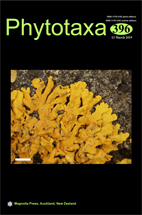Abstract
Within the Altai-Sayan region, we identified 103 species of Teloschistaceae from 1193 field records supported by herbarium vouchers. The recorded species belong to the subfamilies Xanthorioideae (46 species in 14 genera) and Caloplacoideae (57 species in 17 genera); Teloschistoideae is absent. We divided the 194 surveyed localities into four categories: arid alpine, arid non-alpine, humid alpine, humid non-alpine. Each category has a specific lichen composition and a typical combination of traits. Humid non-alpine localities are mostly inhabited by broadly distributed boreal-montane species; humid alpine sites by arctic-alpine lichens; arid non-alpine habitats are preferred by xerophilous Eurasian species and arid alpine sites by xerophilous Central Asian species with (presumably) large geographic ranges in dry continental Asia. Some arid alpine species have a thick crustose thallus with a very thick medulla and cortex; this morphological trait is confined to the Central Asian group of lichens and is absent from other climatic regions, such as arctic, boreal or oceanic Eurasia. We compared species diversity in the Altai-Sayan region with the Alps. Both regions differ in species and generic composition and the richness is higher in the latter.
Taxonomy: Caloplaca fluviatilis is newly described. New combinations are Pachypeltis insularis, P. pachythallina, P. phoenicopta and Variospora sororicida. Two of Magnusson’s names are newly synonymized: Caloplaca infestans with Pachypeltis intrudens and Caloplaca kansuensis with C. bicolor. In addition to 22 known genera, we define, provisionally, 9 groups of species that may merit recognition as genera. Caloplaca epithallina is provisionally placed in Shackletonia, but we do not formally publish a new combination. Lichenicolous Pachypeltis phoenicopta and Variospora sororicida are less host-specific than originally thought.
Floristics: Caloplaca pratensis is new to Eurasia, Caloplaca helygeoides (= C. diphyodes auct.), C. monacensis and C. soralifera are new to Asia. 12 species are new to Russia, 9 new to Siberia, 9 new to China, 2 new to Kazakhstan, and 2 new to Xinjiang. Outside the studied region Pachypeltis phoenicopta is new to Europe (Spain, Sierra Nevada) and we report the first reliable record of Pachypeltis insularis from Greece (Mt Olympus).

